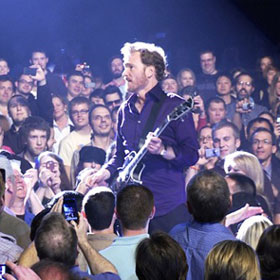Conan O'Brien Can't Stop

4/5
Watching the famously jilted late-night TV host tear around in Conan O’Brien Can’t Stop, one thing swiftly becomes clear – it isn't just a catchy title. When he was forced to stop after refusing to move his Tonight Show gig to midnight in order to save Jay Leno from his primetime slump, it was because O’Brien was legally obligated to not appear on television for six months. Now, this hugely entertaining and voyeuristic film shows us what happened to O’Brien in the months following his departure from NBC, shedding light on his fall into depression and restlessness as a result of a contractual stalemate.
Because he couldn’t legally perform on TV, O’Brien took his act on the road in what he appropriately called The Legally Prohibited from Being Funny on Television Tour, a series of performances that showcased his comedic chops, his bitterness, and impressive musical talents. The film doesn’t only give the audience a fascinating behind-the-scenes peek at the production of the show, but it also paints a portrait of O’Brien as cynical and tortured entertainer who just wants to please others and is never happier when he’s in front of a crowd.
Conan O’Brien Can’t Stop is a hysterical backstage pass to O’Brien’s tour and contains laugh-out-loud moments of O’Brien’s signature slapstick comedy and mockery towards both others and himself. But it’s also a fascinating look into O’Brien’s psychological makeup as a scorned entertainer who pushes himself to his limits to make others happy, even when he is not.
If Conan O’Brien Can’t Stop proves anything, it is that the man is a born entertainer. Whether he’s in a small room with four other people or in front of an audience of a few thousand, O’Brien does whatever he can to get a laugh, even if it’s at others’, or his own, expense. In the rare moments that he’s not performing, O’Brien is completely restless; when he’s backstage waiting for his turn to perform at the talent show for his class reunion at Harvard, he is physically unable to stop moving, whether he’s pacing the room or literally crawling on the floor. But when he’s finally onstage, he comes alive and we can tell that he’s having the time of his life when he’s performing for an audience.
O’Brien gives it his all with every show, whether he’s singing a blues song about his wealthy upbringing, making snarky comments at NBC’s expense, or flailing his lanky limbs with his back-up singers, The Coquettes. O’Brien also proves himself as an accomplished musician, keeping up with musical guests like rock greats Eddie Vedder and Jack White. Even when the show is over, he welcomes a seemingly endless line of fans backstage for autographs and pictures.
Elsewhere, he also receives visits from celebrity friends like Jim Carrey (another guy who can’t seem to be off a stage for more than five minutes, proven when he makes a surprise appearance at one of O’Brien’s shows) and 30 Rock’s Jack McBrayer, who is mocked mercilessly by O’Brien (who must be close with McBrayer, or else O’Brien’s brutal ridicule would be just plain mean). When O’Brien doesn’t see any backstage visitors, he wonders where they are, looking for an opportunity to make some lucky fans’ night.
Behind the film’s hysterical exhibition of O’Brien’s constant attempts to amuse others is the depiction of an emotionally tortured television performer who is legally banned from doing just that. O’Brien is really, really angry, as he makes clear in one-on-one interviews and also in his monologues. He fearlessly makes digs at NBC and Leno to his crew and to his audiences; in an interview with director Rodman Flender, he says he’s so angry he’s unable to breathe. His cynicism is masked by his self-deprecating humor; when he gets off a private plane in an empty lot in Eugene, Oregon, the location of his first show, he sarcastically shoos away invisible paparazzi and fans.
In rare moments of a lone O’Brien, he sits quietly in a stairwell backstage with his head in his hands, an indication of both the pressure he places on himself to do his best and his dissatisfaction of not being on television that he conceals with overt bitterness. Yes, O’Brien did receive a more than reasonable settlement after parting ways with NBC. But in Conan O’Brien Can’t Stop, it’s clear O’Brien is not looking merely for a generous payday; we see a man who has legally lost the ability to do what he loves, and thus does whatever it takes to make others laugh for the sake of his own happiness.
Conan O’Brien Can’t Stop is a must-see not only for O’Brien fans, but also for moviegoers looking for both a good laugh and a captivating look into the workings of a nationwide tour. The film keeps the laughs coming, from O’Brien’s interactions with sidekick Andy Richter to his encounters with his enthusiastic fans, referred to as Team Coco. But the film is also a character study, in a way, that keeps audiences intrigued from start to finish.
Viewers could easily get their O’Brien fix by watching the tall, skinny red-head on Conan on TBS; but Conan O’Brien Can’t Stop is undoubtedly one of the funniest and most honest films of the year with enough simultaneously laugh-out-loud and intimate moments that have O’Brien doing exactly what he does best: making us laugh.
RELATED ARTICLES
Get the most-revealing celebrity conversations with the uInterview podcast!





Leave a comment